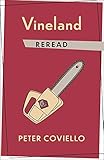Vineland Reread / Peter Coviello.
Material type: TextSeries: RereadingsPublisher: New York, NY : Columbia University Press, [2021]Copyright date: ©2020Description: 1 online resourceContent type:
TextSeries: RereadingsPublisher: New York, NY : Columbia University Press, [2021]Copyright date: ©2020Description: 1 online resourceContent type: - 9780231546041
- 813/.54 23
- PS3566.Y55 V56336 2020
- online - DeGruyter
| Item type | Current library | Call number | URL | Status | Notes | Barcode | |
|---|---|---|---|---|---|---|---|
 eBook
eBook
|
Biblioteca "Angelicum" Pont. Univ. S.Tommaso d'Aquino Nuvola online | online - DeGruyter (Browse shelf(Opens below)) | Online access | Not for loan (Accesso limitato) | Accesso per gli utenti autorizzati / Access for authorized users | (dgr)9780231546041 |
Frontmatter -- CONTENTS -- Prologue: Whatever’s Fair -- PART I -- 1. The Great South Coast Plaza Eyeshadow Raid (’94) -- 2. They Woke, the Thanatoids Awoke (’02) -- PART II -- 3. Scabland Garrison State (’08) -- 4. Secret Retributions (’19– . . .) -- Acknowledgments -- Notes -- Index
restricted access online access with authorization star
http://purl.org/coar/access_right/c_16ec
Vineland is hardly anyone’s favorite Thomas Pynchon novel. Marking Pynchon’s return after vanishing for nearly two decades following his epic Gravity’s Rainbow, it was initially regarded as slight, a middling curiosity. However, for Peter Coviello, the oft-overlooked Vineland opens up new ways of thinking about Pynchon’s writing and about how we read and how we live in the rough currents of history.Beginning with his early besotted encounters with Vineland, Coviello reads Pynchon’s offbeat novel of sixties insurgents stranded in the Reaganite summer of 1984 as a delirious stoner comedy that is simultaneously a work of heartsick fury and political grief: a portrait of the hard afterlives of failed revolution in a period of stifling reaction. Offering a roving meditation on the uses of criticism and the practice of friendship, the fashioning of publics and counterpublics, the sentence and the police, Coviello argues that Vineland is among the most abundant and far-sighted of late-century American excursions into novelistic possibility. Departing from visions of Pynchon as the arch-postmodernist, erudite and obscure, he discloses an author far more companionable and humane. In Pynchon’s harmonizing of joyousness and outrage, comedy and sorrow, Coviello finds a model for thinking through our catastrophic present.
Mode of access: Internet via World Wide Web.
In English.
Description based on online resource; title from PDF title page (publisher's Web site, viewed 27. Jan 2023)


